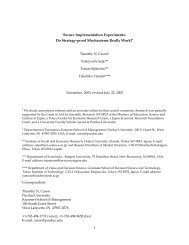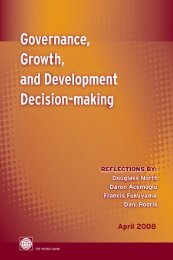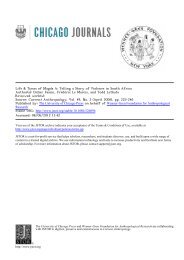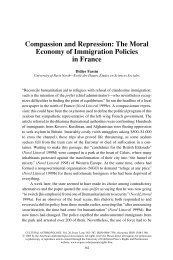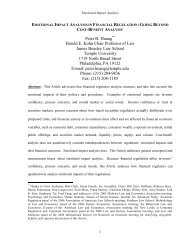The Tools of the Master Slavery and Empire in Nineteenth Century ...
The Tools of the Master Slavery and Empire in Nineteenth Century ...
The Tools of the Master Slavery and Empire in Nineteenth Century ...
You also want an ePaper? Increase the reach of your titles
YUMPU automatically turns print PDFs into web optimized ePapers that Google loves.
THE TOOLS OF THE MASTER 5<br />
<strong>the</strong> o<strong>the</strong>r judges decided that <strong>the</strong> trial itself had taught Egypt an humiliat<strong>in</strong>g lesson. But <strong>the</strong><br />
issues <strong>of</strong> race, slavery <strong>and</strong> colonialism that <strong>the</strong> tribunal had exposed were not as summarily<br />
dispensed with. <strong>The</strong> position <strong>of</strong> Egyptian nationalism had been revealed as perched upon a<br />
peculiar nexus: eager to be rid <strong>of</strong> British colonization <strong>and</strong> yet eager to re-colonize <strong>the</strong><br />
Sudanese <strong>in</strong> some form or ano<strong>the</strong>r. <strong>The</strong> racial constructions <strong>in</strong>herent <strong>in</strong> <strong>the</strong>se circumstances<br />
were also complex. Muhammad Shaghlub, <strong>the</strong> Bedou<strong>in</strong> slave trader, could claim Zanuba as<br />
his wife without fear <strong>of</strong> <strong>in</strong>vok<strong>in</strong>g <strong>the</strong> taboo <strong>of</strong> racial miscegenation that a similar marriage<br />
would have borne <strong>in</strong> Great Brita<strong>in</strong> or <strong>the</strong> United States. Still, she was a slave. Mov<strong>in</strong>g up<br />
<strong>the</strong> economic <strong>and</strong> social ladder, we see <strong>the</strong> pashas <strong>and</strong> <strong>the</strong>ir defenders reformulat<strong>in</strong>g <strong>the</strong><br />
<strong>in</strong>timacy <strong>of</strong> connections to <strong>the</strong> slave women <strong>in</strong>side a more paternalistic <strong>and</strong> political framework<br />
where <strong>the</strong> boundaries <strong>of</strong> difference were bridged by <strong>the</strong> civiliz<strong>in</strong>g mission. Yet slaves<br />
<strong>in</strong>corporated <strong>in</strong>to <strong>the</strong>se households were understood nei<strong>the</strong>r as equals nor as children but as<br />
blank be<strong>in</strong>gs <strong>in</strong> whom <strong>the</strong> proper conduct <strong>and</strong> behavior would be <strong>in</strong>stilled. For many <strong>of</strong> <strong>the</strong><br />
British observers, it was <strong>the</strong>ir sk<strong>in</strong> color that made <strong>the</strong> six slave women vulnerable to<br />
enslavement (where slaves were understood to be victims). But to Egyptians, <strong>the</strong> status <strong>of</strong><br />
<strong>the</strong>ir faith was equally important because Egyptian culture took poly<strong>the</strong>istic religious<br />
practices to be nearly <strong>the</strong> equivalent <strong>of</strong> racial dist<strong>in</strong>ction. Thus <strong>the</strong> women knew <strong>the</strong>mselves<br />
to have been purchased, <strong>and</strong> considered <strong>the</strong>mselves wrongly enslaved because <strong>the</strong> pr<strong>of</strong>ession<br />
<strong>of</strong> <strong>the</strong>ir religion should have removed <strong>the</strong>m from <strong>the</strong> categories <strong>of</strong> <strong>the</strong> enslaveable.<br />
Triangulated Conquest<br />
<strong>The</strong> sc<strong>and</strong>al <strong>of</strong> <strong>the</strong> slavery trial arose at <strong>the</strong> beg<strong>in</strong>n<strong>in</strong>g <strong>of</strong> British imperial expansion <strong>in</strong> <strong>the</strong><br />
Middle East. Egypt was a focal po<strong>in</strong>t. <strong>The</strong> British had occupied Egypt <strong>in</strong> 1882, shortly after<br />
<strong>the</strong> emergence <strong>of</strong> <strong>the</strong> first Egyptian patriotic rebellion, known as <strong>the</strong> `Urabi revolt.<br />
Although <strong>the</strong> <strong>in</strong>corporation <strong>of</strong> Egypt <strong>in</strong>to <strong>the</strong> British empire was <strong>in</strong>formal, it was efficiently<br />
executed. Two years later, a Sudanese religious leader known as <strong>the</strong> Mahdi completed his<br />
own revolt, seiz<strong>in</strong>g Khartoum <strong>and</strong> evict<strong>in</strong>g Egypt from territory it had ruled s<strong>in</strong>ce 1821. <strong>The</strong><br />
British occupation rema<strong>in</strong>ed conf<strong>in</strong>ed to Egypt until 1898, when British-led armies <strong>in</strong>vaded<br />
<strong>the</strong> regions <strong>of</strong> <strong>the</strong> Sudan held by <strong>the</strong> Mahdist government, <strong>and</strong> annexed it aga<strong>in</strong> to Egypt.<br />
British <strong>of</strong>ficials cont<strong>in</strong>ued to run or supervise <strong>the</strong> adm<strong>in</strong>istrations <strong>of</strong> both countries for<br />
decades. <strong>The</strong> ideologies <strong>of</strong> race, empire <strong>and</strong> nation that formed dur<strong>in</strong>g this period must be<br />
read <strong>in</strong> <strong>the</strong> frame <strong>of</strong> <strong>the</strong>se crises.<br />
<strong>The</strong> Egyptian colonial experience <strong>in</strong> <strong>the</strong> Sudan was an encounter that took place <strong>in</strong> two<br />
conjo<strong>in</strong>ed but very different territories: <strong>the</strong> Sudan <strong>and</strong> Egypt itself. <strong>The</strong> adm<strong>in</strong>istration <strong>of</strong><br />
<strong>the</strong> Sudan was known as <strong>the</strong> “Turkiyya” by generations <strong>of</strong> Sudanese because it was <strong>in</strong>itially<br />
conquered by Turkish-speak<strong>in</strong>g <strong>of</strong>ficers for Muhammad `Ali (also known as Mehemet Ali),<br />
<strong>the</strong> Albanian Ottoman <strong>of</strong>ficer who was act<strong>in</strong>g as a governor <strong>of</strong> Egypt for <strong>the</strong> Ottoman<br />
<strong>Empire</strong> <strong>in</strong> <strong>the</strong> early n<strong>in</strong>eteenth century. <strong>The</strong> “Turkish” characterization <strong>of</strong> <strong>the</strong> adm<strong>in</strong>istration,<br />
made by people unfamiliar with <strong>the</strong> nuances <strong>of</strong> Egypt’s population, also disguises <strong>the</strong><br />
fact that native-born, Arabic-speak<strong>in</strong>g Egyptians participated <strong>in</strong> <strong>the</strong> colony’s adm<strong>in</strong>istration<br />
(<strong>and</strong> more notably as decades passed <strong>and</strong> <strong>the</strong> adm<strong>in</strong>istration streng<strong>the</strong>ned its roots). Many<br />
Egyptians served <strong>in</strong> <strong>the</strong> army <strong>in</strong> <strong>the</strong> Sudan, f<strong>in</strong>d<strong>in</strong>g <strong>the</strong>re opportunities for promotion impossible<br />
to duplicate <strong>in</strong> Egypt itself dur<strong>in</strong>g <strong>the</strong> 1860s <strong>and</strong> 70s. Muhammad `Ali <strong>and</strong> his<br />
successors tried periodically to create Sudanese battalions, <strong>and</strong> although <strong>the</strong>se efforts had<br />
only varied success, <strong>the</strong>y cont<strong>in</strong>ued for decades. Many regiments <strong>of</strong> Egyptian soldiers were<br />
created which tra<strong>in</strong>ed alongside <strong>the</strong> Sudanese <strong>in</strong> Upper Egypt. 14 Egyptian notables <strong>of</strong>ten<br />
considered post<strong>in</strong>gs <strong>the</strong>re a terrible exile, yet cont<strong>in</strong>ued to regard <strong>the</strong> Sudan as an <strong>in</strong>tr<strong>in</strong>sic



